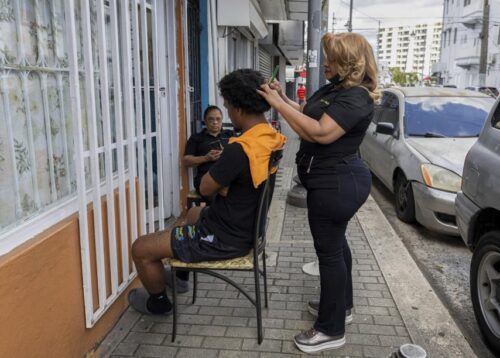PARIS — With diplomacy on the war in Ukraine splintering in various directions, President Emmanuel Macron of France held meetings Thursday with top US officials that were designed to preserve at least the appearance of a united front.
At a working lunch with Secretary of State Marco Rubio and Steve Witkoff, President Trump’s envoy, Macron discussed “peace negotiations aimed at ending the Russian aggression in Ukraine,’’ a statement from the French presidency said.
That wording appeared unlikely to please the Trump administration, which has taken a different view of the conflict. It has claimed that Ukraine was responsible for Russia’s invasion, berated President Volodymyr Zelensky of Ukraine for being ungrateful, and aligned with the likes of North Korea in rejecting a United Nations resolution condemning Russia for its aggression.
Still, greeting Rubio and Witkoff, Macron said in English that “this is a very important occasion for convergence.’’
Trump’s shift on Russia and other measures have led to rising tensions between Europe and the United States over what is widely seen as a sharp ideological shift in Trump’s America, away from support of Western democracies and toward a sympathetic view of authoritarian regimes. Yet, despite pursuing a separate line of diplomacy, at least until today, the Trump administration seems to want some help from Europe in ending the fighting in Ukraine.
A later French presidential statement said the meeting “illustrated the regular dialogue between France and the United States on major international issues in order to secure stability and preserve multilateral cooperation.’’ It offered scant details on Ukraine.
An agreement was reached to hold a further high-level meeting on Ukraine in London next week, said officials close to the French president, who customarily request anonymity in line with their jobs.
Macron and Trump speak to each other regularly by phone, often in an impromptu way, the officials said. The two leaders developed a cooperative, if sometimes uneasy, relationship during Trump’s first term in office.
Before the lunch meeting, Macron spoke with Zelensky, the French presidency said. Zelensky called in a statement for “pressure’’ on the Kremlin to “end the war and guarantee a durable peace.’’
Witkoff, who was in Moscow last week for five hours of meetings with Russian President Vladimir Putin, the third such encounter since Trump took office in January, has said he is trying to develop a “friendship, a relationship’’ with Putin.
In the view of Trump, such conciliation with Russia, widely viewed with suspicion or outrage in Europe, is needed to secure a 30-day cease-fire in Ukraine, to be followed by negotiations for a lasting peace.
Trump’s diplomacy has appeared stalled. His outreach to Russia has taken place as Europe has redoubled its assurances of political and military support to Ukraine. Putin has balked, setting various conditions for a cease-fire. The Russian bombardment of Ukraine continues. The Ukrainian Foreign Ministry said Thursday that three people, including one child, were killed in overnight Russian drone attacks that continued during the day, to devastating effect.
Last week, the German defense minister, Boris Pistorius, said, “Given Russian’s ongoing aggression against Ukraine, we must concede peace in Ukraine appears to be out of reach in the immediate future.’’ He also expressed uncertainty about how long the United States would continue its support for Ukraine.
But Giorgia Meloni, the right-wing Italian prime minister whose conservative views have led Trump to call her “a fantastic woman,’’ described the United States as a “reliable partner,’’ during a visit to Washington on Thursday. The remark illustrated divergent views of Trump among European powers.
“I’m just trying to get it stopped so we can save a lot of lives,’’ Trump said of the war Sunday.
His diplomacy has not been helped by a growing view in Europe that the United States under Trump should now be viewed as an adversary. Trump and senior administration officials have in recent weeks called Europe “pathetic,’’ a “permanent security vassal,’’ and the locus of an attempt to “screw the United States,’’ among other dismissive remarks.
“We find ourselves with two adversaries: Russia and the United States,’’ Bruno Fuchs, a centrist lawmaker who is the president of the National Assembly’s foreign affairs committee, said in an interview Thursday. “Or perhaps, at best, one-and-a-half.’’
Speaking after a recent three-day visit to Washington, Fuchs said he encountered a climate of “shock and spreading fear,’’ and had the impression of “an American police state taking form.’’ The result, he said, was a stark ideological clash between Europe and the United States.
A Ukrainian delegation, including Andriy Yermak, Zelensky’s chief of staff, and Andrii Sybiha, the foreign minister, also arrived in Paris on Thursday and met with Macron’s foreign policy adviser, Emmanuel Bonne.
“The parties will discuss ways to achieve a complete ceasefire, the involvement of a multinational military contingent to guarantee sustainable peace’’ and the strengthening of Ukraine’s “security architecture,’’ Sybiha wrote on social media.
However, the “multinational military contingent,’’ known in Western capitals as “a reassurance force,’’ is highly contentious. Moscow has rejected outright any such international military presence.
